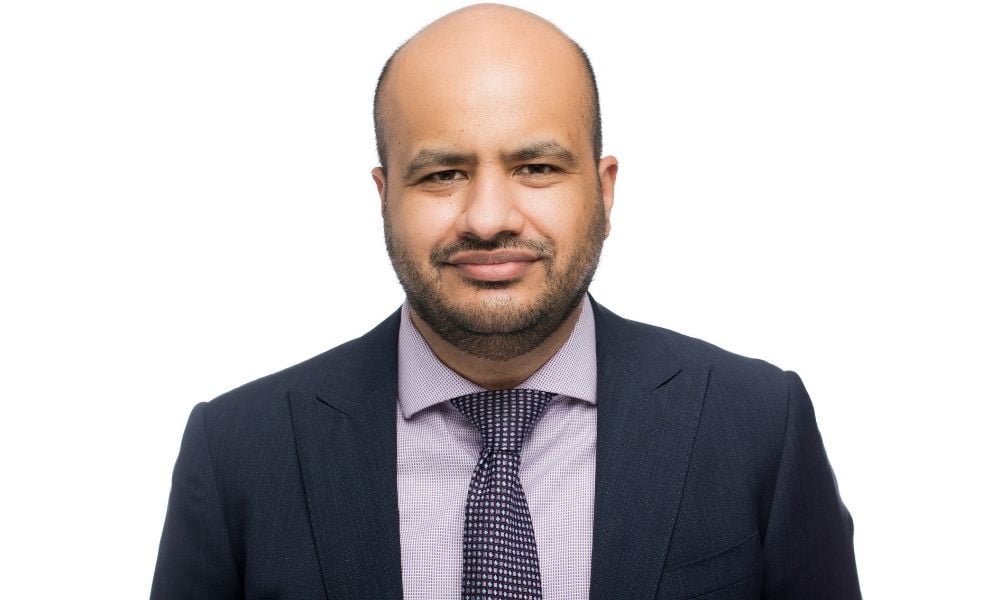Legal Aid Alberta criminal trial group uses a holistic approach to dealing with high-needs clients

There is probably no such thing as an “easy” client for some lawyers. The individuals and the legal issues they face are probably as different as snowflakes.
Still, some clients have more needs than others – and in Alberta, that is where Legal Aid Alberta’s Criminal Trial Group comes into play. The group, created just over a year ago, looks at creative and holistic ways to help them through what likely is among the more difficult times in their lives.
“Our group represents Albertans who qualify for legal aid coverage but might have some very particular needs and challenges,” says Inayat Jetha, the legal services manager with the Calgary criminal trial group at Legal Aid Alberta.
“In many ways, the people we deal with represent the Canadian social fabric - young people under 18, Indigenous and other racialized Canadians, newcomers,” Jetha says. Many may also be struggling with challenges outside of specific legal issues such as homelessness, addiction or drug abuse, mental health problems and cultural, social and language barriers.
For these reasons, he says, some elements make these cases more complex. “We’re talking about the most vulnerable Albertans, and our focus is to provide the service they need.”

Bjoern Wolkmann, Vignesh Pillai
One of the members of the criminal trial group, Sarah Dover, says “the expectation of the organization is to bring the best of your knowledge, experience and creativity to fight for complex clients facing serious charges.”
Jetha says it is difficult to say which of the many needs of these clients are most “difficult” to deal with, and many of the challenges overlap. For example, dealing with a language barrier by finding an interpreter may sound relatively easy, but finding a particular interpreter that speaks a specific dialect could make that difficult. Add any other problems – substance abuse, lack of housing, mental illness – and any case takes on its complexity.
“It’s hard to put these challenges on a continuum because often they overlap, and we have to find a way of being creative to address these issues and make the best case for their legal cases in court,” says Jetha.
Vignesh Pillali, one of the lawyers on the team says he represents clients “who are at the margins of society for a variety of reasons and whose legal problems are often only one of the many challenges they may be facing in their life” He adds that “it is challenging, but also rewarding, to serve as an advocate for these people in what is often an impersonal and overwhelming system.”
Even contacting clients can be a challenge. Some don’t have stable housing, some don’t have cell phones, and if they do, they might not have a data plan that allows them access to the internet, and calls are made on a pay-as-you-go plan, which can be costly.
And Jetha says that during COVID-19, when there was an emphasis on meeting virtually the lack of connectivity, reaching clients could be complicated. “Sometimes it would be a matter of setting a date and time to meet at the courthouse and hope that things would work out.”
Another way of helping these clients is reaching out to family or friends who may be able to provide specific assistance, like a place to stay or shed light on the client’s circumstances that lead to charges being laid. “In some cases, these clients haven’t been connected with family or friends for a long, long time.”
In addition to the Calgary criminal trial group, there is one in Edmonton. Both teams are comprised of experienced lawyers and “justice navigators” who take on the bulk of the role of trying to meet the unique needs outside of the clients’ legal problems.
Says Jetha: “We take a holistic approach, combining the traditional ways of solving a legal problem, and then incorporate the non-legal challenges and circumstances to see the case through the court system.” The justice navigators are critical to this holistic approach, as they are the Legal Aid staff providing many of the “social worker” functions these clients need.
“So, if it’s a matter of having difficulty contacting a client, we’ll task our justice navigator to reach out as best they can to connect and offer support if, let’s say, housing is the issue. Once the client is in stable housing, Jetha says it can get the ball rolling to find a job or upgrade their schooling. If mental health or substance abuse is a factor, getting the proper help, such as a rehabilitation centre, becomes the focus.
“Once that process has started, we can then find a more detailed patch to resolving the matter – whether it is a trial, for example, or guilty plea,” Jetha says.
Bjoern Wolkmann, a junior lawyer on the team who came from a private practice, says he is surrounded by senior counsel and has access to resources he’s never had before. “The variety of files, and the levels of court, we attend to has affirmed my decision to leave private practice.”
Jetha and his team are also willing to take the time needed to do the legal work properly. “We have the advantage of being able to do that, so we can work with our clients through the healing process,” he says. “Once we reach a point where they feel they are getting better, than we can focus more on the legal issues.”
Team member Kathleen Reyes says that as a lawyer who has focused on youth criminal defence, she appreciates the opportunity the program offers young client “to maintain continuity with lawyers who know their familial background, level of functioning cognition, and other issues to help work for just outcomes.”
The clients that Jetha’s team works with are dealt with through the regular provincial court system, though there are also special drug addiction courts and mental health courts – which have their criteria – to which some cases can be referred.
Part of the legal challenge, Jetha says, is to help the court hearing their case understand the unique circumstances of the team's clients.
“That’s our role – to draw a big red circle around our clients’ challenges and needs so that the court can better picture the situation.”
For the most part, judges are sympathetic to the situation facing the client of Jetha’s teams, “but I see our job as lawyers is to make sure it stays on the front burner.”
Jetha says that working with “high-needs” clients is challenging. However, it is also “very job affirming as you get to see the transition in people.”
“From someone who may have been awkward and hesitant to look you in the air, it’s amazing to see these people start to heal and know that you may be part of making a permanent change to their lives.”
Dover explains the feeling of satisfaction this way: “I was recently preparing for a bail review for a homeless client in custody. I asked him ‘What’s different in your life now from all those times in the past when you failed to come to court?’ He replied, ‘Now I have you, before I was lost.’”
She adds that she wants to “show up at work every day striving to be worthy of the expectation to provide the highest calibre of lawyering possible to the most vulnerable Albertans.










